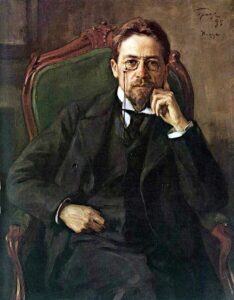Joanna Murray-Smith is torn. On the one hand the acclaimed playwright is an in-demand adaptor of classic works not written in English. On the other hand she’s suspicious of the need for such adaptations (as opposed to existing translations) in the first place. It’s a demand stemming from the burning need for “relevance”, the current buzzword in theatrical circles, as companies, still recovering from the pandemic, frantically try to attract new and hopefully younger audiences.
Almost any play penned longer ago than 2010 is seemingly a contender for the “relevance” treatment, although, as Murray-Smith points out, classics become classics quite specifically because “they transcend time”.

Nonetheless, she sprinkles her modernist magic dust over plays by the likes of Ibsen, Strindberg and Chekhov. The latter’s Uncle Vanya is about to open at the Ensemble, and director Mark Kilmurry approached Murray-Smith because he wanted it be as contemporary for his audiences as it was for Chekhov’s audiences 125 years ago.
Studiously avoiding anything “revolutionary”, she strives to preserve the original, while gently disguising aspects that mark the play as “historical”, and therefore in the minds of some theatre-goers, “not about my world”.
“I don’t think that the play needs to be made contemporary at all,” she emphasises. “There’s a fashion for contemporizing historical texts so that the audience has the easiest way into them. In a good production of a Chekhov, you really don’t need to make any changes if you don’t want to: you can present it in the world at the end of the 19th century… I’m not doing very well at selling my own job here, but a lot of the time I think the modernizing is completely unnecessary. In fact, I kind of find it enchanting when I see a play done in the historical setting now, it’s so rare.”
Ways for theatres to attract new people must be explored, however, with Murray-Smith suggesting the industry has probably never faced greater challenges. Given that her own plays are produced world-wide, she’s well-placed to comment. “Around the western world, theatre companies have not yet recovered from the pandemic,” she says. “It broke the ritual of going to the theatre for people, and then they had stop and think about whether they wanted to recommit.”

The upshot was companies losing subscribers, who opted for individual productions over being locked into multiple shows. “Theatre companies are really struggling,” says Murray-Smith. “They’re also all trying to address the fact that the audience is middle-aged or older – often quite considerably older. So they’re all battling to try and get younger generations engaged in the art form. I think that they see contemporary settings and contemporary language is a way of doing that.”
She starts her adaptation process by reading multiple translations, and reaching her own conclusions about the playwright’s aims. “Sometimes if I felt that, for instance, a line was intended to have a comic quality to it,” she explains, “but the comedy didn’t feel as if it were going to reach a contemporary audience, then I would rewrite the comedic lines in a way that I felt would make the audience laugh…
“Culturally, things do change. In many quite literal interpretations of Chekhov, the comedy is missing because it just doesn’t translate to now. So then I think the contemporary writer can in a way be truer to Chekhov than a more literal, traditional text would be.”
Kilmurry believes that Murray-Smith’s skill in this regard means that the reaction to a comedic line should mimic that of Chekhov’s Russian contemporaries. “Joanna has such a great sense of humour,” he says, “that she can reinterpret that material and make it relevant, but still stay true to the original.” He also suggests that much Chekhovian comedy which might be lost on some audiences relates to characters routinely complaining about their lot. “As we know,” he says, “Russian – and also I’d say British – people love being miserable. They love moaning, and no one pays any attention to them, which is where the humour comes from.”

Chekhov satirised Russian society, although without cruelty towards individual characters. “He had this sort of bohemian aura,” says Kilmurry, “but also this love of humanity. That comes across in his plays because his characters can be hilarious, and they’re depressed, and they’ve got all these characteristics, but he has a fondness for all of them.”
“That’s what makes him such a genius writer,” adds Murray-Smith. “Part of the job is always to help us understand why people are the way they are, and why they act the way they do, and no one was better at it than Chekhov… Many people have said that nothing happens in a Chekhov play, but if I see a really good production of a Chekhov, then I have this feeling of momentousness at the end of it, like you’ve gone up a notch in your understanding of humanity, and that’s almost the most powerful thing that drama can do.”
Murray-Smith has relocated the play in neither time nor place, although she has simplified the names. “I make as few changes as I can,” she says, hoping that “a gentle hand and an enduring love affair with the original and with the writer, as I have with Chekhov” may help beckon “resistant audiences” into the plays. “So I’ve been happy to be asked,” she continues, “and in adapting him for the modern audience, the best thing I can do is try and make it what Chekhov intended.”
She delights in the process, partly because her own writing shares such Chekhovian preoccupations as societal change, family dynamics, intricate emotional relationships and the effect of privilege. “Of course, locations and time periods change,” she concedes, “but what it is to be human has not changed… So in that sense, it’s not very difficult at all to get inside the world of the play. It’s all familiar territory. It’s just that he does it better than I could.”
Uncle Vanya: Ensemble Theatre, July 26-August 31.